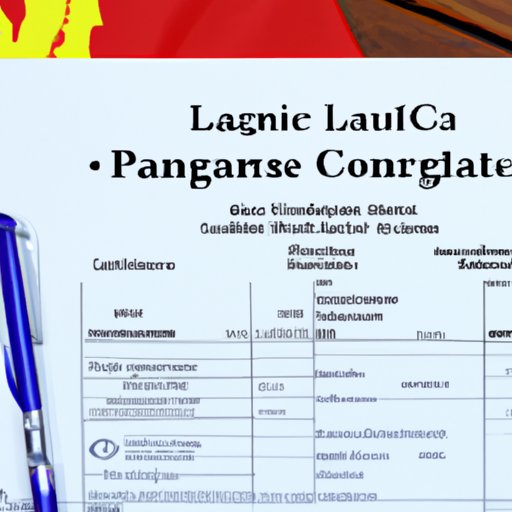Introduction
Starting a limited liability company (LLC) in Georgia is relatively simple, but there are a few steps that must be followed in order to ensure compliance with state laws. This guide provides step-by-step instructions on how to set up an LLC in the state of Georgia.
Create a Business Plan
The first step to starting an LLC in Georgia is to create a business plan. This document should include your goals, research on the market, and a financial plan. Having a business plan will help you stay organized and focused as you begin the process of forming your LLC.
Identify Your Goals
Before you start the process of setting up an LLC, it’s important to identify your business goals. What do you hope to achieve? How will you measure success? Answering these questions will give you a clear direction for your business and help you make decisions throughout the formation process.
Research Your Market
Once you’ve identified your goals, it’s time to do some research on the market. What type of products or services will you offer? Who is your target audience? Knowing who your customers are and what they need will help you create a successful business.
Develop Your Financial Plan
The next step is to develop a financial plan. This includes estimating start-up costs, predicting income and expenses, and creating a budget. Having a financial plan in place will ensure that your business is properly funded and can grow over time.
Select Your Business Structure
The next step is to select a business structure. The most common types of business structures are sole proprietorship, partnership, limited liability company (LLC), and corporation. Each structure has its own advantages and disadvantages, so it’s important to choose the one that best fits your needs.
Selecting Between Sole Proprietorship, Partnership, Limited Liability Company (LLC), and Corporation
A sole proprietorship is owned and operated by a single individual. It is the simplest and least expensive business structure, but it also offers the least amount of legal protection. A partnership is similar to a sole proprietorship, but it is owned and operated by two or more individuals. A corporation is a separate legal entity owned by shareholders and managed by directors. It offers the most legal protection but is also the most expensive and complicated business structure.
Advantages of an LLC
A limited liability company (LLC) is a hybrid of the sole proprietorship and corporation. It offers the same limited liability protection as a corporation, but it is easier to set up and less expensive to maintain. An LLC also allows for flexible management structures and tax benefits. For these reasons, it is often the preferred business structure for small businesses.
Choose a Name for Your LLC
Once you’ve decided on a business structure, it’s time to choose a name for your LLC. The name must include “LLC” or “limited liability company,” and it must be distinguishable from other registered businesses in the state. There are also restrictions on words like “bank,” “insurance,” and “university,” so it’s important to check the state’s naming requirements before submitting your application.
Naming Requirements
In Georgia, LLC names must include “LLC,” “L.L.C.,” “Limited Liability Company,” or “Limited Company.” The name must also be distinguishable from any other registered business name in the state. Certain words, such as “bank,” “insurance,” and “university,” may require additional paperwork or licensing.
Reserving a Name
If you have chosen a name for your LLC and want to reserve it before filing the Articles of Organization, you can do so by filing a Name Reservation form with the Georgia Secretary of State. The form must be filed online and costs $25. The reservation is valid for 120 days.

File the Articles of Organization
Once you’ve chosen a name for your LLC, you can file the Articles of Organization with the Georgia Secretary of State. This document must include the name and address of your LLC, the name and address of the Registered Agent, the purpose of the LLC, and the duration of the LLC. It must be signed by all members of the LLC.
Contents of the Articles of Organization
The Articles of Organization must include the following information: the name and address of the LLC; the name and address of the Registered Agent; the purpose of the LLC; the duration of the LLC; the name and signature of each member of the LLC; and the name and signature of the Organizer (if applicable).
Filing Fees
The filing fee for the Articles of Organization is $100. This fee can be paid online or by mail. If paying by mail, the form must be accompanied by a check or money order made payable to the Georgia Secretary of State.

Obtain an Employer Identification Number
Once you have filed the Articles of Organization, you must obtain an employer identification number (EIN) from the Internal Revenue Service (IRS). An EIN is a unique nine-digit number used to identify your business for tax purposes. You will need this number when filing taxes, opening a bank account, and applying for licenses and permits.
What is an EIN?
An EIN is a unique nine-digit number assigned by the IRS to identify a business for tax purposes. It is used to report taxes, open a bank account, and apply for licenses and permits.
How to Apply for an EIN
You can apply for an EIN online, by fax, or by mail. The application is free and takes about 10 minutes to complete. Once you have received your EIN, you can use it to file taxes, open a bank account, and apply for licenses and permits.

Comply With Other Tax and Regulatory Requirements
Once you have obtained an EIN, you must comply with other tax and regulatory requirements. This includes registering with the Georgia Department of Revenue, obtaining licenses and permits, and filing annual reports. Failure to comply with these requirements can result in fines or other penalties.
Register With the Georgia Department of Revenue
All LLCs in Georgia must register with the Georgia Department of Revenue. To do so, you must submit a Business Registration Application online or by mail. There is no fee to register, but you must renew your registration annually.
Obtain Licenses and Permits
Depending on the type of business you are running, you may need to obtain additional licenses and permits. These can include a sales tax permit, a food service license, or a professional license. It is important to research the specific requirements for your business before applying for any licenses or permits.
Create an Operating Agreement
An operating agreement is a document that outlines the rules and regulations for your LLC. It should include information about membership, ownership, management, and decision making. Creating an operating agreement is not required by law, but it is recommended as it can help prevent disputes between members and ensure that everyone is on the same page.
What is an Operating Agreement?
An operating agreement is a document that outlines the rules and regulations for your LLC. It should include information about membership, ownership, management, and decision making. This document is not legally required, but it is recommended as it can help prevent disputes between members and ensure that everyone is on the same page.
Creating an Operating Agreement
Creating an operating agreement for your LLC is relatively simple. You can use a template or hire an attorney to draft the document. Be sure to include information about membership, ownership, management, and decision making. Once the document is finalized, all members should sign it and keep a copy for their records.
Conclusion
Forming an LLC in Georgia is a relatively simple process, but there are several steps that must be taken in order to ensure compliance with state laws. This guide provides an overview of the steps to form an LLC in Georgia, including creating a business plan, selecting a business structure, filing the Articles of Organization, obtaining an EIN, complying with other tax and regulatory requirements, and creating an operating agreement. Following these steps will help ensure that your LLC is properly formed and can operate smoothly.
(Note: Is this article not meeting your expectations? Do you have knowledge or insights to share? Unlock new opportunities and expand your reach by joining our authors team. Click Registration to join us and share your expertise with our readers.)
